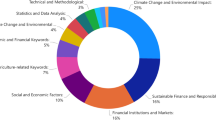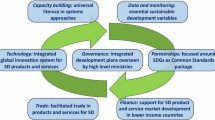Abstract
The literature on international environmental agreements has recognized the role transfers play in encouraging participation in international environmental agreements. However, the results achieved so far are overly specific. Therefore, we develop a more general framework that enables us to study the role of transfers in a systematic way. We propose transfers using both internal and external financial resources for making “welfare optimal agreements” self-enforcing. To illustrate the relevance of our transfer scheme, we use a stylized integrated assessment simulation model of climate change to show how appropriate transfers may induce almost all countries into signing a self-enforcing climate treaty.
Similar content being viewed by others
References
Altamirano-Cabrera, J.-C., & Finus, M. (2006). Permit trading and stability of international climate agreements. Journal of Applied Economics, 9(1), 19–48.
Aumann, R. J., & Drèze, J. H. (1974). Cooperative games with coalition structures. International Journal of Game Theory, 3(4), 217–237.
Barrett, S. (1994). Self-enforcing international environmental agreements. Oxford Economic Papers 46 (October), 804–878.
Bloch, F. (2003). Non-cooperative models of coalition formation in games with spillovers. In C. Carraro (Ed.), Endogenous formation of economic coalitions, (pp. 35–79). Cheltenham, UK: Elgar.
Bosello, F., Buchner, B., & Carraro, C. (2003). Equity, development, and climate change control. Journal of the European Economic Association, 1(2–3), 601–611.
Bosello, F., Buchner, B., Carraro, C., & Raggi, D. (2004). Can equity enhance efficiency? Some lessons from climate negotiations. In C. Carraro & V. Fragnelli (Eds.), Game practice and the environment, (pp. 37–64). Cheltenham, UK: Elgar.
Botteon, M., & Carraro, C. (1997). Burden-sharing and coalition stability in environmental negotiations with asymmetric countries. In C. Carraro (Ed.), International environmental negotiations: strategic policy issues, (pp. 26–55). Cheltenham, UK: Elgar.
Buchner, B., Carraro, C., & Cersosimo, I. (2002). Economic consequences of the US withdrawal from the Kyoto Protocol. Climate Policy, 76(2), 1–20.
Carraro, C. (2000). Roads towards international environmental agreements. In H. Siebert (Ed.), The economics of international environmental problems, (pp. 169–202). Tübingen: Mohr Siebeck.
Carraro, C., & Siniscalco, D. (1993). Strategies for the international protection of the environment. Journal of Public Economics, 52(3), 309–328.
Carraro, C., & Siniscalco, D. (1998). International environmental agreements: Incentives and political economy. European Economic Review, 42(3–5), 561–572.
Carraro, C., & Siniscalco, D. (2001). Transfers, commitments and issue linkage in international environmental negotiations. In A. Ulph (Ed.), Environmental policy, international agreements and international trade, (pp. 19–37). Oxford: Oxford University Press.
Chander, P., Tulkens, H. (1997). The core of an economy with multilateral environmental externalities. International Journal of Game Theory, 26(3), 379–401.
d’Aspremont, C., Jacquemin, A., Gabszewicz, J. J., & Weymark, J. A. (1983). On the stability of collusive price leadership. Canadian Journal of Economics, 16(1), 17–25.
Eyckmans, J., & Finus, M. (2004a). Measures to enhance the success of global climate treaties. Forthcoming in International Environmental Agreements: Politics, Law and Economics.
Eyckmans, J., & Finus, M. (2004b). An almost ideal sharing scheme for coalition games with externalities. CLIMNEG Working Paper Nr. 62. Leuven, Belgium: Katholieke Universiteit Leuven.
Eyckmans, J., & Tulkens, H. (2003). Simulating coalitionally stable burden sharing agreements for the climate change problem. Resource and Energy Economics, 25(4), 299–327.
Eyckmans, J., & Finus, M. (2006). Coalition formation in a global warming game: how the design of protocols affects the success of environmental treaty-making. Natural Resource Modeling, 19(3), 323–358.
Finus, M. (2001). Game theory and international environmental cooperation. Cheltenham, UK: Elgar.
Finus, M. (2003a). Stability and design of international environmental agreements: The case of transboundary pollution. In H. Folmer & T. Tietenberg (Eds.), International yearbook of environmental and resource economics, 2003/4, (pp. 82–158). Cheltenham, UK: Elgar.
Finus, M. (2003b). New developments in coalition theory: An application to the case of global pollution. In L. Marsiliani, M. Rauscher & C. Withagen (Eds.), Environmental policy in an international perspective, (pp. 19–49). Dordrecht, The Netherlands: Kluwer.
Finus, M., Sáiz, E., & Hendrix, E. M. T. (2004). An empirical test of new developments in coalition theory for the design of international environmental agreements. Mansholt Working Paper Series, Nr. 14. Wageningen, The Netherlands: University of Wageningen.
Hoel, M. (1992). International environment conventions: The case of uniform reductions of emissions. Environmental and Resource Economics, 2(2), 141–159.
IPCC (2001). Climate change 2001: Mitigation. Contribution of working group III to the third assessment report of the intergovernmental panel on climate change. Cambridge, UK: Cambridge University Press.
Jeppesen, T., & Andersen, P. (1998). Commitment and fairness in environmental games. In N. Hanley & H. Folmer (Eds.), Game theory and the environment, (pp. 65–83). Cheltenham, UK: Elgar.
Maskin, E. (2003). Bargaining, coalitions, and externalities. Mimeo. Paper presented at the EEA–ESEM Meeting in Stockholm, August.
Nordhaus, W. D., & Yang, Z. (1996). A regional dynamic general-equilibrium model of alternative climate-change strategies. American Economic Review, 86, 741–765 (September).
Petrakis, E., & Xepapadeas, A. (1996). Environmental consciousness and moral hazard in international agreements to protect the environment. Journal of Public Economics, 60(1), 95–110.
Weikart, H.-P., Finus, M., & Altamirano-Cabrera, J.-C. (2006). The impact of surplus sharing on the stability of international climate coalitions. Oxford Economic Papers, 58(2), 209–232.
Yi, S.-S. (2003). Endogenous formation of economic coalitions: a survey of the partition function approach. In C. Carraro (Ed.), Endogenous formation of economic coalitions, (pp. 80–127). Cheltenham, UK: Elgar.
Author information
Authors and Affiliations
Corresponding author
Rights and permissions
About this article
Cite this article
Carraro, C., Eyckmans, J. & Finus, M. Optimal transfers and participation decisions in international environmental agreements. Rev Int Org 1, 379–396 (2006). https://doi.org/10.1007/s11558-006-0162-5
Received:
Revised:
Accepted:
Published:
Issue Date:
DOI: https://doi.org/10.1007/s11558-006-0162-5




